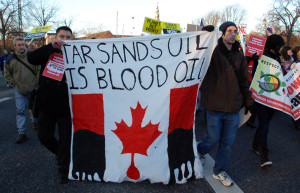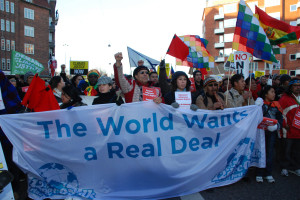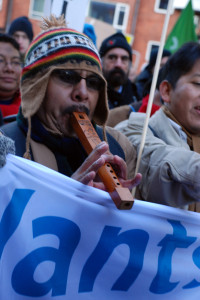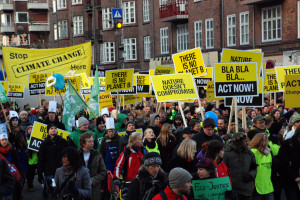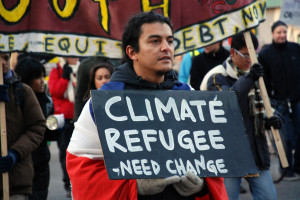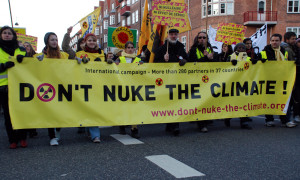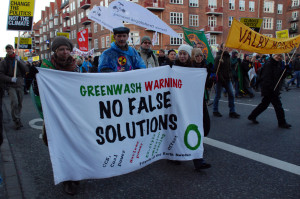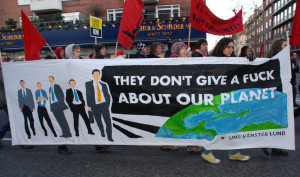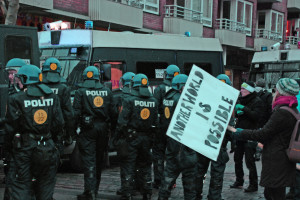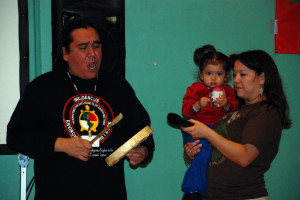[youtube=http://www.youtube.com/watch?v=WZAAv-7Ir80&hl=en_US&fs=1&]
Tag Archives: indigenous rights
Tar Sands Action in Copenhagen
Comments Off on Tar Sands Action in Copenhagen
Filed under Actions / Protest, Climate Change, Climate Justice, Copenhagen/COP-15, Indigenous Peoples
Canadian First Nations People Protest the Tar Sands in Copenhagen
December 14, 2009
Canadian First Nations at COP 15 Roll Out the Welcome Mat for Stephen Harper in Rally at Canadian Embassy
“Hey Harper: Climate Commitments = Shut Down Tar Sands”
Copenhagen, Denmark – Indigenous Peoples of Canada and their allies from around the world are in Copenhagen for the UN summit on climate change. Today they rolled out the “welcome mat” for Prime Minister Stephen Harper near the Canadian Embassy in Copenhagen. This action was part of a global day of action against the Canadian tar sands. The tar sands are the largest and most carbon intensive industrial project on the planet. Indigenous leaders of communities impacted by the tar sands and allied campaigners contend that Canada hasn’t kept Kyoto commitments and hasn’t ratified the UN Declaration on the Rights of Indigenous Peoples (UNDRIP) because of the half-trillion dollar investments the massive tar sands development represents.
In a gesture of hospitality for the Prime Minister and an act of solidarity with communities directly impacted by the tar sands, Indigenous representatives and their allies delivered a gift basket full of Treaties for Prime Minister Harper to honor and/or sign in Copenhagen. These included important documents such as the Kyoto Protocol, First Nations Treaties and the UN Declaration on the Rights of Indigenous Peoples.

Indigenous Peoples' protest tar sands and they were stopped one half block short by police from going to the Canadian Embassy in Copenhagen. They rally did occur. There were no arrests/ photo: Langelle/GJEP-GFC
“As Indigenous People, we are here at the international climate negotiations to speak about threats to our cultural survival and the direct life-threatening impacts of climate change in our communities,” said Clayton Thomas Muller, Tar Sands Campaigner of the Indigenous Environmental Network. “Canada has been blocking the climate negotiations and hasn’t kept Kyoto commitments or ratified the UNDRIP because of the tar sands.”
“Fossil fuel extraction from the tar sands are killing our people with cancer, killing our culture by destroying our traditional lands, and killing our planet with CO2,” said Eriel Tchekwie Deranger, member of the Athbasca Chipewyan First Nation and Tar Sands Campaigner for the Rainforest Action Network. “It seems that Canada is more committed to fossil fuels than human rights or real action for the climate. Mr. Harper – We welcome you to Copenhagen because we want real action on climate, and that means shutting down the tar sands and a moratorium on new fossil fuel development.”
“The tar sands are a key reason why Canada has failed to take climate action. In the same timeframe that Harper promises to cut Canada’s emissions a paltry 3 per cent, tar sands emissions are expected to triple,” said Maude Barlow, national chairperson of the Council of Canadians.
Today’s action is part of a global day of action organized by a coalition of groups including: Indigenous Environmental Network, Rainforest Action Network, Council of Canadians, Indigenous Peoples Power Project, and UK Tar Sands Group.
Actions are occurring in tandem with the Copenhagen events in London (UK), Montreal, Toronto, Edmonton, Vancouver and all across North America.
About Indigenous Environmental Network: Indigenous Peoples empowering Indigenous Nations and communities towards sustainable livelihoods, demanding environmental justice and maintaining the Sacred Fire of our traditions. <http://www.ienearth.org/cits>www.ienearth.org/cits
The Indigenous Environmental Network is in Copenhagen for the duration of COP 15. Copenhagen Media Line: +45-526-85596
###
Comments Off on Canadian First Nations People Protest the Tar Sands in Copenhagen
Filed under Actions / Protest, Climate Change, Climate Justice, Copenhagen/COP-15, Indigenous Peoples
Post #8 December 12, 2009
Photo essay of the 12 December March in Copenhagen continues after this blog post
Copenhagen Day of Action on Climate Change:
Energy in the Streets; Disappointment in the Negotiations
Late last night a draft text on the Reducing Emissions from Deforestation and Forest Degradation (REDD) scheme was released. It was strongly condemned by NGOs from around the world. The text of this agreement gave mere lip service to Indigenous Peoples’ Rights and to safeguards against conversion of native forests to timber plantations, not including them in the legally binding body, but rather referring to them in a preamble.
This was no surprise to those of us who have been following REDD since it was formally announced at the UN Climate Conference in Bali, Indonesia in 2007. It was clear then that this was a bunch of greenwash aimed at enriching the world’s most notorious deforesters, while providing the impetus for a massive global land grab directed at the world’s remaining forested lands—most of which are in the territories of Indigenous Peoples.
Thus we were not shocked when, at the Climate Conference last year in Poznan, all references to Indigenous Rights and the UN Declaration on the Rights of Indigenous Peoples were struck from the text by the gang of four: the U.S., Canada, Australia and New Zealand—who always seem to be the bad guys in these UN negotiations.
Nonetheless, for those of us who have been fighting to stop the rampant destruction of native forests for so many years, the total corruption of an agreement to ostensibly curb deforestation is a major kick in the gut.
So it was with REDD in mind that we joined the massive show of people rallying for real and effective action on climate change at Parliament Square in Copenhagen earlier this afternoon.
March organizers estimated the swarming crowd at 100,000. The police said 50,000. The reality being somewhere in the middle, it was certainly the largest protest against climate change ever to have taken place. And when coupled with the marches and protests in more than 100 other countries around the world, it was massive indeed.
Orin and I can attest to the impressive crowd as we crossed through it en route to find our allies in the “system change not climate change” bloc, on the exact opposite side of the square. After 15 or so minutes of squeezing through the crush of the crowd, we managed to find our way to the coffee cart where several of our friends were waiting in an impossible queue for something warm to drink. After waiting for what seemed like forever, with coffees finally in hand, we and our friends made our way in the direction of the “system change not climate change” sound trucks, which were to lead the bloc, but not before one of our German comrades warmed everyone’s coffee with a dollop of whiskey. “To help warm you up on the inside,” he explained.
Another U.S.-based colleague and I remarked that we had certainly never experienced THAT before at a U.S. protest!
We found the Climate Justice Now! bloc with our allies, and ran into Melissa, a woman we had met fifteen years before during the struggle to save the ancient redwoods in California. She had worked with Judi Bari, our friend and colleague who had been blown up by a pipe bomb in 1990 for trying to stop the rampant logging of some of the oldest and most majestic trees on the planet—the 100 meter tall, 2,000 year old redwoods, being felled for hot tubs and outdoor furniture. Melissa was passing out stickers that elicited naughty giggles in nearly everyone who read them. They read “fck, fck, fck the system,”—a direct response to the very mainstream “tck, tck tck” campaign initiated by some of the larger NGOs.
The march consisted of numerous blocs, spread out over several kilometers. Orin and I made our way to the very beginning of the march, where the Indigenous Peoples’ delegation was leading the way. Orin photographed their delegation and we then gravitated to the side where we documented each bloc as it passed, waiting for our allies with the System Change bloc. The images he captured during the hour or more that the march flowed by are captured in the photo essay included here.
After an interminably long time, toward the end of the march we finally spied the sound trucks with the green banners that signified the beginning of the System Change bloc. We connected with some of our allies and photographed them moving by. After they had passed we walked toward the back of the bloc to see what else we could find, and just as we did, a mass of police vans moved in and blocked the street, cutting off a section of the march. Another cluster of police vans cut them off from the back. We tried to move in to take photos of the situation and document the preemptive roundup, but were roughly shoved back by police who quickly taped off the area. We watched the stand off for 40 minutes or so, alerting some of our allies to the alarming situation.
Hundreds of march participants flooded back to the scene of the round up, and we could here pounding drums along with the chant, “Let them go! Let them go!” echoing through the corridor of tall brick Danish buildings. They were not let go, and at last report, an estimated 700 had been arrested.
We unfortunately had to leave before the conclusion of the standoff because Orin had lost his official UN press credentials somewhere in the crush of people. Without them he would be unable to participate in the protests and other events planned inside the Bella Centre in the coming week. So we needed to get them replaced before the registration desk closed for the night. We found a running metro that delivered us to the Bella Centre. We managed to avoid the incredibly long line of unaccredited people shivering in the frigid Danish air through some evasive action that took us inside to the press accreditation line and resulted in Orin procuring a new badge in record time.
In the security line for the metal detectors, we bumped into another colleague who recounted to us her experience with nearly getting nabbed in the roundup. She told us she sensed something was up and literally ran ahead, just missing the advance of the police vans. She continued with the march, she told us, to the very end at the Bella Centre, but was prevented from entering the UN premises, even with her accreditation badge, because she was with the march. “So I climbed the fence,” she told us. “I was just too cold to wait any longer.”
So much for their security…
The metro ride back toward the hotel was hellish. The metro arrived at the Bella Center stop already crowded. We and about four others managed to smash ourselves on, thinking not one more person could possibly fit. We were proved wrong about 2 stops down where another half dozen people forced their way into our end of the car. By the time we got to the Christianshavn stop, we couldn’t stand it anymore and retreated to the street to find a bus. This stop was only a few blocks from where we had stood when the black bloc had been surrounded, and the police lights were still blazing. Realizing quickly that this meant no buses were to come, we waved down a cab and zoomed back to the hotel to sit down, finally, warm up and to complete our computer work for the day.
This is not the last, but the first big action this week. Tomorrow there is an action planned which intends to shut down the Copenhagen port, to call attention to the massive greenhouse gas emissions caused by the shipping industry. Nearly every day next week some action is planned and will reach a crescendo with the “Reclaim Power” action on Wednesday—the day that the high level ministers arrive—which is intended to occur both on the inside of the Bella Centre, as well as on the outside, with both sides to meet for a “Peoples’ Assembly” to discuss real and just solutions to the climate crisis.
The big challenge of that day is the fact that the UN Climate Secretariat has announced that they are severely restricting the access of NGOs to the Bella Centre—only allowing access to a privileged handful of “observers.”
Some of us believe that this signals the end of the UN Climate process. It has truly become the World Carbon Trade Organization and is behaving as such through meetings behind closed doors and absolute restriction of participation to only those chosen few, and their complicit, bleating, sheep-like media.
Now it is time for the people of the world who want to stop the oncoming train of climate catastrophe to stand up and “Reclaim Power.” We will be reporting from the Reclaim Power protests in Copenhagen this coming Wednesday.
Wish us luck.
Reporting from the streets of Copenhagen,
Anne Petermann, Executive Director, Global Justice Ecology Project
Comments Off on Post #8 December 12, 2009
Filed under Actions / Protest, Climate Change, Climate Justice, Copenhagen/COP-15, Indigenous Peoples, Photo Essays by Orin Langelle, Posts from Anne Petermann
Post #7 December 11, 2009
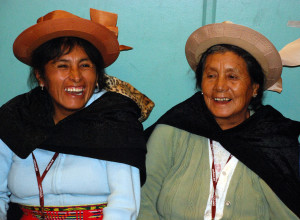
Indigenous Peoples Speak Out. Global Justice Ecology Project teamed up with the Indigenous Environmental Network with co-sponsorship by Global Forest Coalition to help create a space for Indigenous Peoples to share their experiences, stories and songs. We felt this was a critically important event to highlight the voices of Peoples who are being shut out of the official climate negotiations, even though they are some of the peoples being most profoundly affected by the climate crisis.
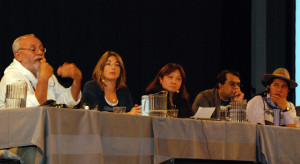
Panel discussion from Klimaforum09’s “Towards a Peoples Tribunal on Ecological Debt and Climate Justice.” New Voices on Climate Change participant Lidy Nacpil from Jubilee South listens to Ricardo Navarro of Friends of the Earth El Salvador (left); Naomi Klein sits between them. Photo: Langelle/GJEP-GFC

Global Forest Coalition releases their monitoring report on the UN’s Reducing Emissions from Deforestation and Forest Degradation scheme. GFC had people monitor the potential impacts of REDD in countries targeted for REDD projects. The report was highly critical of the potential social and ecological impacts of this market-driven forest scheme. Photo: Langelle/GJEP-GFC
Comments Off on Post #7 December 11, 2009
Filed under Climate Change, Climate Justice, Copenhagen/COP-15, Indigenous Peoples, Photo Essays by Orin Langelle
Post #6 December 10, 2009
Outrage at CorporateHaven
by Anne Petermann, Executive Director, Global Justice Ecology Project
Emotions here at the UN Climate Conference in Copenhagen are beginning to run very high.
The leak to the press of a document prepared by the Danish government in collaboration with other rich countries raised a lot of ire among those countries and peoples who were excluded from this process, which apparently occurred behind some very closed and secret doors.
In response, the African delegation staged a spontaneous and angry protest in the halls of the Bella Center, chanting “two degrees is suicide!” in reference to a section of the leaked Danish that would allow for a two degree rise in global temperatures–which would lead to the deaths of millions of people in Africa due to expanding droughts and floods, as well as loss of crop productivity.
And this theme of expressing outrage over the impacts of climate change on indigenous and forest dependent communities and others was carried over with a series of events and protests today.
This morning, on Human Rights Day, the Indigenous Environmental Network and the Indigenous Peoples Power Project held a “Procession, Prayer and Rally for Indigenous Rights” at the US Embassy in Copenhagen. On the day that Obama accepted his unfathomably ironic Nobel Peace Prize, this rally took place to raise awareness about the impacts of the US energy industry’s war on Indigenous lands in the US. Later in the day another Indigenous protest was held against the US when Interior Secretary Ken Salazar spoke at a press conference about the US commitment to renewable energy–on the very same day they announced that they were opening up the arctic to oil drilling. Hypocritical doesn’t even begin to describe this callous and calculated PR move.
The expansion of oil drilling in the Arctic is a slap in the face to the rest of the world that came to Copenhagen hoping for leadership from Obama, and instead got the same old US obstructionism that has contributed to the negative image of the US internationally.
The Change promised by the Obama Administration seemingly refers to Climate Change. It really has been a whole lot of hot air.
As I write this, the Indigenous Peoples Speak Out is taking place. Global Justice Ecology Project teamed up with the Indigenous Environmental Network with co-sponsorship by Global Forest Coalition to create a space for Indigenous Peoples to share their experiences, stories and songs. We felt this was a critically important event to highlight the voices of Peoples who are being shut out of the official climate negotiations, even though they are some of the peoples being most profoundly affected by the climate crisis.
The event started with a prayer by IEN Director Tom Goldtooth and songs by IEN youth and staff–Day Gots and Clayton Thomas-Mueller. Throughout the afternoon Indigenous Peoples shared their stories about the histories of their people, and the impacts of fossil fuels and climate change on their communities and lands. Powerful voices poignantly described the effects of the melting of the arctic on the islands off of Alaska, the devastating results of the rising sea levels on the islands of the South Pacific, the cancers and diseases being experienced by native peoples as a result of the energy industry. Participants came from North and South America, Africa and the South Pacific, yet the stories they shared all echoed one another.
The undercurrent was one of profound anger and sadness.
Down the hall, a Peoples Tribunal on Climate Debt is under way, with representatives of the developing world discussing the historical obligations of rich countries to repay the South for the resources stolen over the course of hundreds of years, and for the impacts today of climate change.
Yesterday, Global Justice Ecology Project organized a panel on the UN’s Reducing Emissions from Deforestation scheme. Presenters included Sandy Gauntlett, a Maori from Aoteroa (New Zealand) who expressed his seething ire over REDD because it was doing nothing to stop the sinking of the islands of his region. Camila Moreno was indignant over the implementation of REDD in Brazil, where some of the people most responsible for the rampant destruction of the Amazon stood to profit handsomely from this scheme. Marcial Arias, a Kuna from Panama passionately described the displacement of Indigenous Peoples in Panama for projects designed to offset carbon emissions in the North.
The outrage is growing. It has been simmering under the surface with year after year of inaction, and now the rapidly accelerating crisis of climate change has caused the pot to begin boiling over, and we will be seeing more and more outrage and anger over the coming days.
We will do our best to cover these protests and their messages and give you our reactions to them.
Comments Off on Post #6 December 10, 2009
Filed under Climate Change, Climate Justice, Copenhagen/COP-15, Indigenous Peoples, Posts from Anne Petermann
GJEP’s Anne Petermann on WORT FM
October 26th--Check out Global Justice Ecology Project’s E.D., Anne Petermann, speaking about the links between forests, the REDD scheme and the upcoming climate talks in Copenhagen (CorporateHaven) on WORT’s program A Public Affair out of Madison, Wisconsin. She is in interviewed in the second half of the show after co-author of Climate Coverup, The Crusade to Deny Global Warming, James Hogan.
To listen, please click HERE
Comments Off on GJEP’s Anne Petermann on WORT FM
Filed under Climate Change
World Forestry Congress: Or How I Learned to Stop Worrying and Love Plantations
Anne Petermann, Executive Director, Global Justice Ecology Project & North American Focal Point of Global Forest Coalition, posted on this blog everyday last week from the World Forestry Congress.
Buenos Aires, Argentina Oct. 23, 2009- Adjacent to the lounge area at the World Forestry Congress are two shallow pools with sporadically placed globs of water plants growing in them. Floating in and among these water plants, posing as water lilies, are big pink Gerber Daisies. Hanging from the ceiling are plastic birds suspended by fishing line. Over the loudspeaker, very tinny sounding recorded bird songs. This bizarre setting, I believe, serves as a perfect metaphor for what I have seen at this, my first, World Forestry Congress.
In seminar after seminar I have witnessed plantation-crazed maniacs posing as people deeply concerned with the well-being of our forests. Even at the Forest Restoration session the topic was not threats to the world’s forests and techniques to restore forests and their biodiversity. No, the workshop on “restoring forests” was all about growing monoculture tree plantations. (sigh.)
Nearly every session here has been first and foremost a public relations campaign aimed at drilling into the heads of all, but especially the young impressionable forestry students, that the industrial plantation forestry is our best bet for saving the forests. These forestry hucksters congratulate themselves and each other for being such good con artists. And their jargon is flawless. They have coopted the terminology developed by social movements and environmental organizations brilliantly. Capacity building and Consultations with Indigenous Peoples, Sustainable Forestry Management, Net Zero Deforestation, Forest Restoration, Reducing Emissions from Deforestation, Ending Illegal Logging, Certification, Advancing Social and Ecological Values, Environmental Stewardship, Sustainability Criteria… and on and on… So beautiful, so moving. (Pay NO attention to the man behind the curtain!)
But if you actually listen to the presentations you can find the subtext and hear what they are actually saying. It is like something from George Orwell’s 1984. For example, yesterday at a session on REDD, a woman overseeing a REDD project in Brazil pointed out that her project in the Juma forest is raising money by partnering with corporations including Marriott and Coke. For every night someone stays in a Marriott hotel, they donate $1 to the REDD project in order to offset the emissions of their guests (no, not the emissions released BY their guests). The lesson: the more we consume, the more we conserve. Brilliant!
This logic then also spills over into the effort to promote trees for bioenergy as a means to fight climate change. We can reduce emissions from deforestation while we reduce more emissions by logging more trees! 2+2=5! War is Peace! (Hmmm, the guy sending more troops to kill people in Afghanistan DID just got the Nobel Peace Prize…)
Then there was the World Wildlife Fund session on Thursday night on “Stimulating Forest Investments—how to finance forest destruction, oops, I mean, conservation. (Funded, you might like to know, by CitiBank and USAID, among others.)
Mark Constantine, of the International Finance Corporation talked about their work in Indonesia. He had a very neat and tidy little chart that talked about “Challenges” (there’s that word again!) in one column and “Opportunities” in another.
Challenge: Peat Swamp Forest Conversion. Opportunity: Reforestation of Degraded Lands. Now, remember boys and girls what we just learned about “forest restoration.” That’s right, the “challenge” of peat swamp forest destruction in Indonesia provides us with the “opportunity” to plant tree monocultures!
In another chart, he listed the “Risks” of certain activities, next to a column called “mitigation.” The first item under “risks” was “unsustainable logging & biodiversity loss” The mitigation: certification and NGO partnerships. In other words, when you do unsustainable logging and destroy biodiversity, you will need to mitigate your image by getting sustainable forestry certification and partnering with an NGO like WWF.
Another presenter was Roberto Waack, from the Forest Stewardship Council, your friendly neighborhood forest certifiers. (Didn’t realize forests needed to be certified, did you? You thought they just grew.) His presentation was quite illuminating. First he pointed out what FSC does: “Advancing Sustainable Forest Management [you will remember from our lesson yesterday that SFM includes conversion of forests to monoculture timber plantations] through Standards, Certification and Labeling.”
They now have 115 million hectares of certified forests (both “natural” and “planted”) in 82 countries, with over 15,000 FSC certificate holders in 99 countries. They have certified productive forests worth over $20 billion. In 2007, they experienced 40% growth in their FSC “supply chain.” You should have seen their graph! Nothing but up, up, up! FSC, he explained, is a “multi-billion dollar brand.”
They are also working with operators to help them transition to “clean energy” from biomass, and are supporting new markets and multiple use of forests—including bioenergy.
This is all well and good, you say, but what has it got to do with protecting forests? Honestly, I have no idea…
The final session of the day is going on as I write this. It is the session on “recommendations” for the congress. As my recommendations would be in the realm of removing themselves from the planet, I thought it best to abstain from attending. If I had to hear one more talking head blather about sustainably destroying the planet, I would have lost my mind completely.
So there you have it. The World Forestry Congress in a nutshell. 6,000 participants (including approximately 6 Indigenous People) and millions of tons of emissions devoted to exactly what purpose? Toward the noble goal of building the capacity to manage forests sustainably toward zero net deforestation in order to restore the forest, thereby reducing emissions from deforestation and ending illegal logging through certified sustainability criteria and environmental stewardship that advances social and ecological values.
Who could argue with that?
Comments Off on World Forestry Congress: Or How I Learned to Stop Worrying and Love Plantations
Filed under Climate Justice, Indigenous Peoples, Posts from Anne Petermann, REDD
Forest Protection and Indigenous Rights Organizations Globally Denounce the World Forestry Congress
Blog post by Anne Petermann, Executive Director, Global Justice Ecology Project & North American Focal Point of Global Forest Coalition. Every day this week she will be posting an update from the World Forestry Congress on this blog
Buenos Aires, Argentina – Rather than writing another lengthy blog post on the absurdities witnessed at the XIII World Forestry Congress in Buenos Aires, today I offer you some of the views of our allies regarding the Congress.
First you will find comments on REDD made by Camila Moreno, who is Global Justice Ecology Project’s Brazilian representative and a New Voices on Climate Change participant. She made the comments during a panel presentation on REDD organized by the Climate Media Partnership at the congress on Thursday, October 22.
My second post is the presentation by Marcial Arias, who is a Kuna from Panama, on the impacts of REDD on Indigenous Peoples. Marcial gave this presentation during the same panel presentation as Camila for the Climate Media Partnership.
Next I have posted an excerpt from a statement by World Rainforest Movement criticizing the claim of the congress to be “carbon neutral.” WRM boycotted the congress, instead writing a detailed and sharp critique of it.
Finally, you will find Global Forest Coalition’s formal letter of resignation to the World Forestry Congress Advisory Board. GFC resigned from the WFC Advisory Board after every recommendation they made was ignored.
Camila Moreno on Brazilian Social Movements Denouncing REDD
Camila Moreno, speaking on behalf of New Voices on Climate Change for the panel organized by the Climate Media Partnership, pointed out the widespread opposition to UN’s REDD scheme by communities, Indigenous Peoples, social movements and organizations in Brazil and throughout Latin America. She began her presentation by reading the Belém Letter: the statement denouncing REDD adopted by Brazilian NGOs and social movements.
You can read the letter at http://www.globaljusticeecology.org/connections.php?ID=323.
She went on to further elaborate the criticism by Latin American groups to including forests in the carbon market, and called for an opening of space for discussion on the true causes of climate change including its underlying drivers, in contrast to the lack of space for any dissent or in-depth conversations found at the World Forestry Congress.
Marcial Arias (of the International Alliance of Indigenous and Tribal Peoples of the Tropical Forest, and Global Forest Coalition) on the Views of Indigenous Peoples on REDD
I have some serious concerns about REDD, which I will explain.
For Indigenous Peoples the trees are more than wood. The trees mean food, medicine, shelter, and that is not being recognized by REDD.
Next, REDD is being promoted for poverty alleviation. I will explore if this is true. First, these types of market mechanisms are not new, we saw something similar through the CDM (Clean Development Mechanism of the Kyoto Protocol) which has had great impacts on Indigenous communities. For example, the CDM has led to the development of monoculture timber plantations and also large dams on Indigenous lands, and these have had very grave impacts on Indigenous peoples. Examples of this exist throughout Latin America and Africa.
The mechanisms of REDD+ include developing monoculture timber plantations. With these plantations comes the use of agro-toxics and herbicides. This is reducing the life expectancy in Indigenous communities, and you can already see the damage to peoples’ health due to tree plantations and associated agro-toxins.
Another important issue is the question of benefits for avoided deforestation. The tradition of the Kuna People is to do small-scale sustainable logging in the summer. It is part of the culture. How much will we be paid to change our culture?
Then there is the problem of informing communities about the problems of REDD. I am reasonably informed, but it is very difficult to explain to the people in indigenous communities just what REDD will mean to them.
Finally, the governments must to take into account the UN Declaration on the Rights of Indigenous Peoples with REDD. It is essential that this UN declaration is taken into account, and it is critical that the people have the ability to say no to these projects. And finally, the traditional knowledge of Indigenous Peoples must be taken into account in the development of REDD.
Excerpt from World Rainforest Movement on the carbon neutral fraud at the World Forestry Congress
For the entire critique, please visit WRM’s website at http://www.wrm.org.uy/
According to its organizers, the XIII World Forestry Congress (WFC), to be held from 18 – 23 October, in Argentina, “will be the first World Forestry Congress which shall achieve ‘Carbon Neutral’ ranking”. The organizers plan to reach such status through the purchase of “carbon credits” from Nobrecel’s “Forestry-industrial Sector Biomass Energy Project” in Brazil.
The monoculture tree plantation “forests”
Before analysing the validity of the “carbon neutrality” claim, it is important to understand where the “carbon credits” are coming from, because this relates directly to the misleading slogan of the WFC: “Forests in Development: a vital balance”.
In line with a definition that equates plantations with forests, the WFC organizers did not find any problem in making a deal with Nobrecel, a company holding an extensive area of eucalyptus “forest” in Brazil, which feeds its pulp mill in the State of São Paulo.
The “carbon neutral” myth
The idea of “neutralising” fossil fuel emissions is based on the premise that the carbon released from burning fossil fuels can in some way be “neutralised” by other activities such as the Nobrecel project. This is simply not possible.
What needs to be understood is that the carbon released through the use of fossil fuels (coal, oil and natural gas) has not been part of the functioning of the biosphere for millions of years. Once fossil fuels are extracted and burnt, that carbon –which until then had been safely stored underground- is released, thereby increasing the above ground carbon stock. Once released, that carbon cannot be returned to its original storage place and the more it is extracted, the more the total amount of carbon in the biosphere is increased, thus further enhancing the greenhouse effect.
In the case of the WFC, the organizers themselves explain that most of the emissions related to its meeting will come from overseas flights. Carbon neutral flights are perhaps the best way to show that this is a cheating game. Planes do not fly on renewables; they run on oil. Once burnt to enable the planes to fly, the carbon contained in the fuel is released. Nothing can make that carbon return back underground.
Instead of channeling money to a company such as Nobrecel –thus subsidizing its destructive activities- the international forestry sector could show its commitment with our Planet by ceasing to promote monoculture tree plantations. Instead of trying to achieve an impossible “carbon neutrality” it could tackle the much more achievable objective of excluding tree monocrops from the definition of forests.
Global Forest Coalition Letter of Resignation to the World Forestry Congress
Dear Mr. Heino,
When Dr. Miguel Lovera as Chairman of the Global Forest Coalition agreed to join the Advisory Committee of the XIII World Forestry Congress, he did so because he hoped he would have been able, as the only representative of Southern NGOs and Indigenous Peoples’ Organizations on this committee, to contribute some of the views of our IPO and NGO members to the preparatory process of the Congress. He and his colleague Simone Lovera, who participated on his behalf in the Advisory Committee meeting in March 2009, submitted various proposals to enhance the participation of Indigenous Peoples’ representatives, Southern NGOs and women in the congress. He also proposed to have a greater emphasis on forest restoration in the congress and to ensure the program of the congress reflected a clear distinction between forest restoration and the expansion of monoculture tree plantations, considering the massive opposition of social movements against the latter.
Regretfully, he did not get any response on these suggestions.
As Miguel Lovera started working as advisor to the Paraguayan Minister of the Environment in June 2009 he asked me to substitute him in the Advisory Committee. When I was accepted as his substitute, I asked you and other members of the Advisory Committee about your response to the proposals GFC had submitted, and about ways I could participate effectively in the work of the Advisory Committee in general. On August 12 I received a response from Ines Matyszczyk that my “message of 9 August has been referred to Mr Olman Serrano, Associate Secretary-General of the XIII WFC, who will get in touch with you directly to follow-up on GFC’s proposal”. But we did not get any response from him or anybody else so far.
We have not been consulted at all about speakers, or other elements of the Congress’ programme. Having now reviewed the final program as it is posted on the WFC website, we feel there is a severe lack of participation of Indigenous Peoples and Southern NGOs amongst the main speakers. Except for two keynote speakers from COICA, the coordinating body of Indigenous Peoples of the Amazon, we recognize hardly any Indigenous peoples’ representatives amongst the speakers.
We feel the program of the congress is very much biased towards industry and government representation and that it lacks representation of Indigenous peoples and forest-dependent communities. We also feel there is a lack of balance between proponents of carbon offsets and wood-based bioenergy and more critical voices amongst the WFC speakers.
Meanwhile, we have understood that specific requests by our Argentine NGO colleagues to allow more local NGOs and social movements to participate in the congress have been denied as well.
In summary, we feel the WFC Organizers have not taken us seriously as part of the advisory committee. Based on our concerns, I regret to inform you that I decided to resign as a member of the Advisory Committee of this congress.
Signed, Andrei Laletin, Global Forest Coalition
Comments Off on Forest Protection and Indigenous Rights Organizations Globally Denounce the World Forestry Congress
Filed under Climate Justice, Posts from Anne Petermann, REDD

